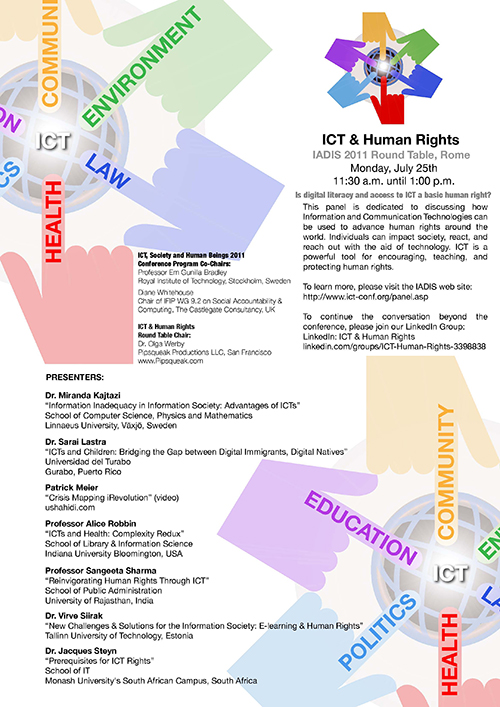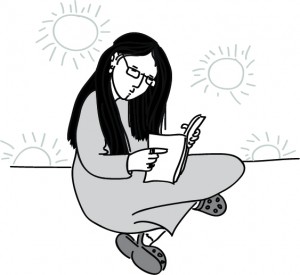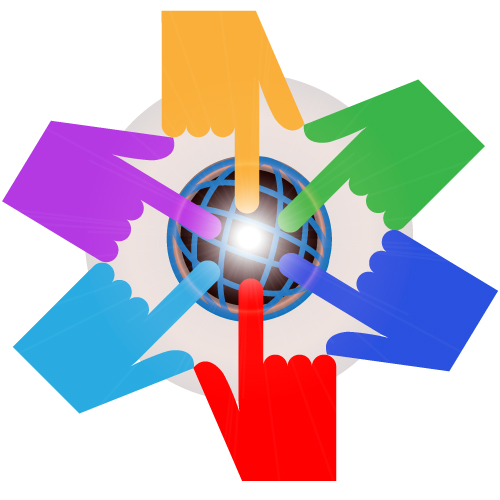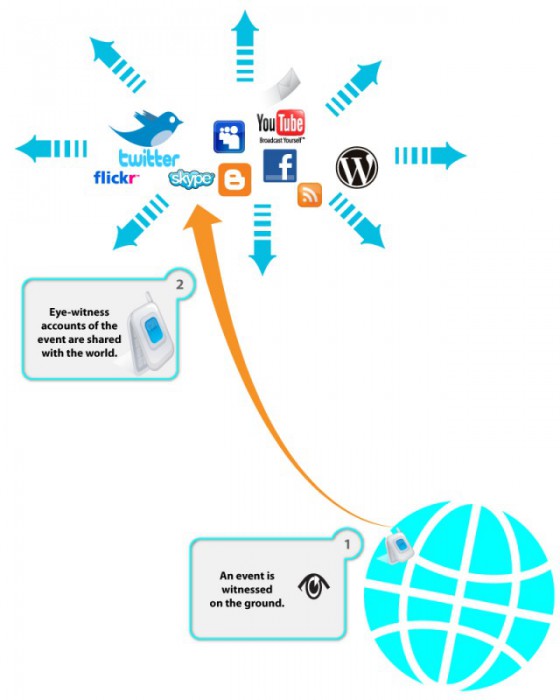Interfaces.com was given a free advanced preview of Thomas Erickson’s report and videos on social computing. The videos are very well produced and provide an interesting point of view and good insights on social media. Below are few of my notes based on the video content and ideas discussed on this blog in the past (my former students should find these familiar). Social Media Definitions & Ideas Social Computing: this is really about groups working together using ICT (Information Communication Technologies). I think this is a broader definition then the one offered by Thomas Erickson, as it includes all forms of ICT. Social Scaffolding: we all have a set of social scripts — culturally-specific, socially constructed norms of behavior — that help us navigate group interactions and allow for self-organization of crowds, at least shot-term and for a limited goal (like crossing the street). [Please watch Dr. Erickson’s example of street crossing in “Video 4.3: Social Computing video 3 – Face-to-face Interaction as Inspiration for Designing Social Computing Systems”.] Product design needs to create opportunities for social interaction — these scaffolds have to be built into the system: meeting spaces, places to sit down, well-lit areas, easy communication tools, games,…
Tag Archive for ICT
Conceptual Design, Pipsqueak Articles
ICT & Human Rights Conference Notes and Thoughts
by Olga Werby •

ICT & Human Rights Panel at IADIS The presenters in attendance, in order of presentation: Professor Sangeeta Sharma Title of presentation: Reinvigorating Human Rights Through ICT School of Public Administration University of Rajasthan, India Professor Alice Robbin Title of presentation: ICTs and Health: Complexity Redux Indiana University Bloomington Dr. Sarai Lastra Title of presentation: ICTs and Children: Bridging the Gap between Digital Immigrants, Digital Natives Universidad del Turabo Gurabo, Puerto Rico Dr. Miranda Kajtazi Title of presentation: Information Inadequacy in Information Society: advantages of ICTs School of Computer Science, Physics and Mathematics Linnaeus University, Växjö, Sweden Dr. Jacques Steyn Title of presentation: Prerequisites for ICT Rights School of IT Monash South Africa Patrick Meier and Dr. Virve Siirak were unable to attend in person. I summarized Patrick’s work in my opening statement and I hope Dr. Siirak would comment on his work below or on our LinkedIn community (ICT & Human Rights—all are welcome to join our open group). Opening Statement I chose to introduce each subtopic of the panel as part of my opening statement and to give it a slightly unusual take for each topic. Below are my notes and I’ve posted the PDF of my KeyNote on…
Conceptual Design, Cultural Bias, Flow, Interaction Design, Interface Design, Language, Perception, Pipsqueak Articles, Product Design Strategy, Scaffolding, Working Memory
The Haptic Feel of Books versus eBooks
by Olga Werby •

We’ve traveled to Rome for our family vacation this year, and aside from a few summer reading books that I couldn’t find in an eBook format, we relied on our two Kindles and 3 iPads for our family reading needs. This is the second summer we brought primarily electronic versions of books—”The Count of Monte Cristo” is much easier to read when it fits into your hand and doesn’t weigh a ton… In the days before the Kindle and iPad, we carried an extra suitcase just for books. But there are drawbacks to buying and reading eBooks. Below are some of my thoughts and experiences—the cogitations of a voracious reader. Time & Progress As I was reading my novels, I found myself repeatedly trying to figure out where in the book I was. How far along was I? When is the next natural break (chapter, section end)? How many pages are there to the end of the chapter, end of the section, end of the book? These were not idle curiosities about my reading accomplishments, although when you do finish reading the book version of “The Count of Monte Cristo”, you do have a sense of having read something. An…
Pipsqueak Articles
ICT & Human Rights
by Olga Werby •

IADIS conference is fast approaching. It will take place at the end of July in Rome, Italy. I’m chairing the ICT & Human Rights panel. Here’s a list of speakers and their topics. I’m also attaching the poster for the session. Please feel free to pass it on to those who might be interested in this topic. Thank you! I hope to see some of you in Rome! 2011-06-29 ICT Human Rights Poster Download ICT & Human Rights Monday, July 25th 11:30 a.m. until 1:00 p.m. This panel is dedicated to discussing how Information and Communication Technologies can be used to advance human rights around the world. Individuals can impact society, react, and reach out with the aid of technology. ICT is a powerful tool for encouraging, teaching, and protecting human rights. To learn more, please visit the IADIS web site: http://www.ict-conf.org/panel.asp To continue the conversation beyond the conference, please join our LinkedIn Group: LinkedIn: ICT & Human Rights linkedin.com/groups/ICT-Human-Rights-3398838 Presenters Dr. Miranda Kajtazi “Information Inadequacy in Information Society: Advantages of ICTs” School of Computer Science, Physics and Mathematics Linnaeus University, Växjö, Sweden Dr. Sarai Lastra “ICTs and Children: Bridging the Gap between Digital Immigrants, Digital Natives” Universidad del Turabo…
Background Knowledge Errors, Pipsqueak Articles
Decision Scaffolding and Crisis Mapping
by Olga Werby •

I’m working on a series of illustrations to highlight the need for decision scaffolding during an aide mission. The ideas are based on the Ushahidi deployment experience in Haiti after the 2009 earthquake. But the idea is to make this more general. I would love ideas and recommendations on how to make this visualization better and more communicative. (read more about crisis mapping here) Crisis: Smoke Signals from Eye-Witnesses Let’s start with a crisis—a natural disaster or a political upheaval leaves thousands of people in desperate need of help. The people on the ground witness the suffering and use ICT (Information Communication Technology) to send up the spoke signals. Please not that Internet services might be compromised (due to deliberate actions taken by the authorities; infrastructure failures; chaotic conditions on the ground), but people tend to be very creative and use phone lines, radios, satellite links, and just person to person communication to get the information out there. During the current Libyan crisis, people were very creative: “To avoid detection by Libyan secret police, who monitor Facebook and Twitter, Mahmoudi, the leader of the Ekhtalef (“Difference”) Movement, used what’s considered the Match.com of the Middle East to send coded love…
Conceptual Design, Cultural Differences, Pipsqueak Articles, Product Design Strategy
ICT & Human Rights: A Round Table Discussion at IADIS 2011 Conference
by Olga Werby •

IADIS conference on ICT, Society and Human Beings, Rome, July 24-26, 2011 Proposal for a Joint Multi-conference Session Title: ICT and Human Rights: A Round Table Chair/Organizer: Olga Werby Background and Purpose Information and Communication Technologies (ICT)—internet, web, and social media—are fast becoming a comprehensive repository and soon an archive of human knowledge. With access to ICT, an individual can become informed on everything from healthcare issues to civic problems to legal concerns. One hundred years ago, people were discussing the need for basic literacy and its impact on the human condition. Today, we should be discussing digital literacy and access in the same way. Digital literacy can be seen as a basic human right. Individuals can also impact society, react, and reach out. ICT is both a powerful tool for materializing human rights and is also challenging human rights. I propose a Round Table Session, which is open to all participants of IADIS multi-conferences, to be titled “ICT and Human Rights.” This session would provide a forum on cross-disciplinary research and development, and action, in the fields of what rights are important and can be better facilitated by ICT in: e-Democracy, ICT and Society, e-Culture, e-Health, e-Learning, human-computer interaction,…
